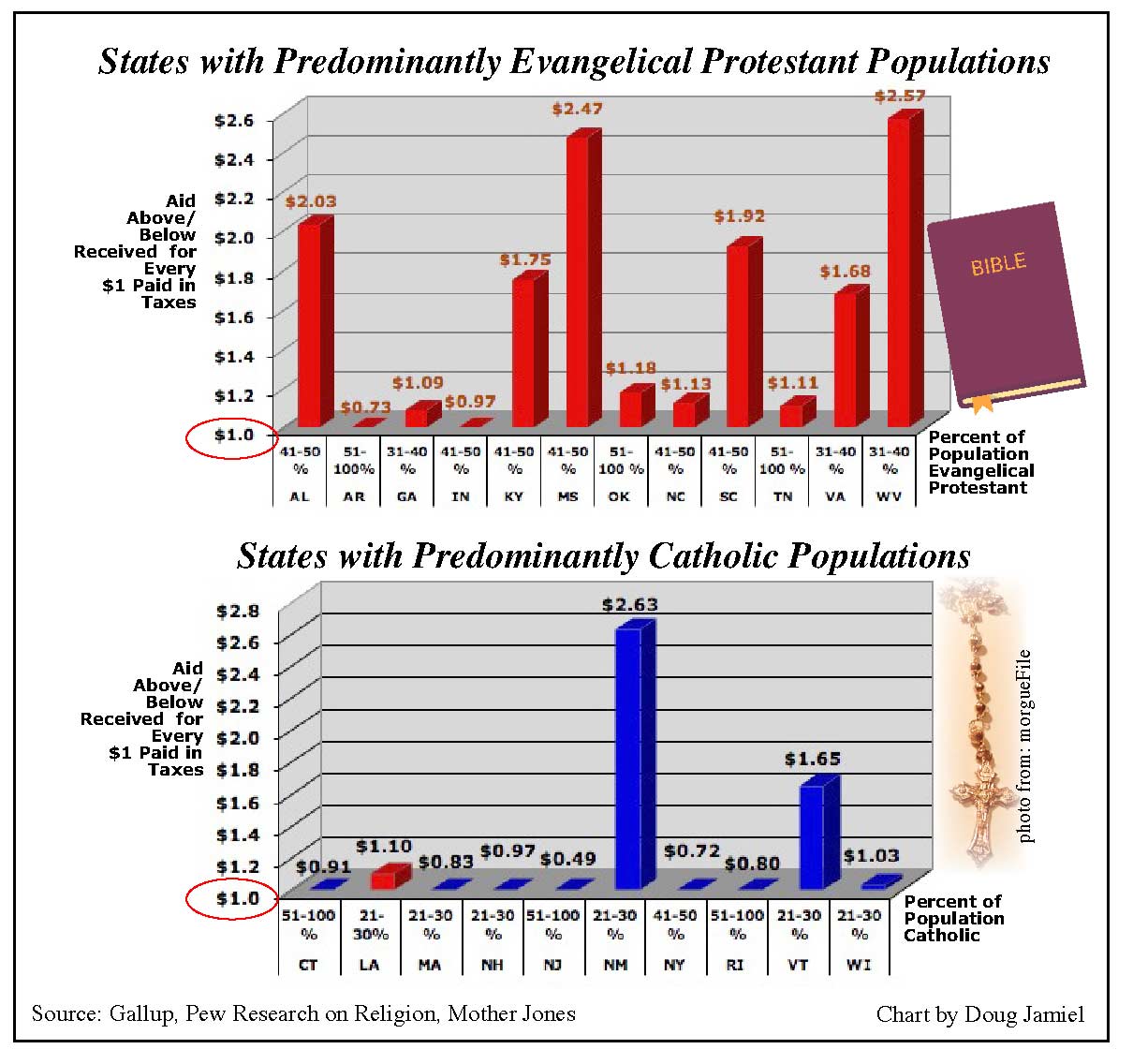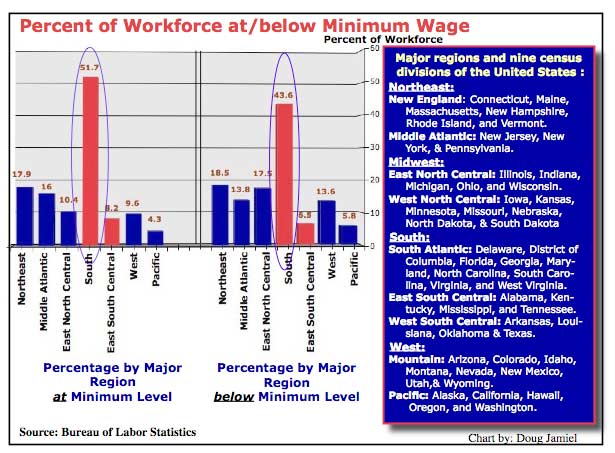Calvinism’s embrace of wealth as a sign of divine election lives on in the red state/blue state religious and social welfare divides.
“A society which reverences the attainment of riches as the supreme felicity will naturally be disposed to regard the poor as damned in the next world, if only to justify itself for making their life a hell in this.”
-R.H Tawney – Religion and the Rise of Capitalism
Under the aegis of the Catholic church, the poor existed for centuries within a universe where aristocrats were, at least in theory, morally obliged to see to their welfare. It was a world in which usury, excessive interest and commercial undertaking was held in check by church dogma. In today’s economic milieu, however, that system of patriarchal obligations has long since given way to glorified rapaciousness and self-interest. The beneficent God of old church doctrine has been given his pink slip and surrendered his cosmic office to the petty barons of Wall Street and the Koch brothers. How has this happened? In three words: the Protestant Reformation; in two more: John Calvin.
Calvin was a 16th-century French-born theologian who, on the heels of Martin Luther’s momentous changes in the Catholic faith, conceived what has come to be known as the Protestant work ethic. While the Protestant work ethic occupies at least part of the conventional wisdom, fewer appreciate John Calvin’s role in its formulation, and fewer still its influence as the root of the right wing’s brutal and nihilistic contempt for social welfare and the less fortunate in the present day. When Sen. Rand Paul cautions against the extension of unemployment benefits to the long-term jobless as potentially destructive to their character, it is merely an echo of a Calvinist doctrine that reverberates back through time, one that demonizes the poor even as it elevates wealth as proof of God’s grace.
As proof that this animus toward the poor is hardly new, R.H. Tawney, in his classic work, Religion and the Rise of Capitalism, reminds us of one Samuel Hartlib, who, in 1650, inveighed against the increase in the population of beggars, stating: “The law of God saith, ‘he that will not work, let him not eat.’ This would be a sore scourge and smart whip for idle persons if … none should be suffered to eat till they had wrought for it.”
In hindsight, while an economist of today could look back and account for the increase in the poor population in Hartlib’s time as the result of skill-less peasants being forced from the countryside into new commercial centers, many on the right, such as Paul, insist even today on seeing the jobless not as victims of a poor economy but as people poor in character. Why is this so? The reason has little to do with economics and everything to do with social dominance. It is an idea borrowed from Calvin and corrupted to suit the political agenda of today’s economic elite. To appreciate how Calvin’s thought figures into the philosophy of today’s right wing, one must understand it in its unadulterated form.
Sanctifying Success
Calvin’s universe was ruled by a petulant and vindictive deity, one who toyed with his followers by designating a select group of them to share in his divine bounty, only to leave them in the dark as to who these lucky chosen might be. The faithful were, then, left to fret and worry whether they were in God’s good graces and, more importantly, whether they would share the common and inescapable fate of eternal damnation that was the certain end of the non-elect. How, then, was one to know if they were one of the elect? The answer: material success. If a businessman’s coffers were fat and he was benefiting from what appeared to be a shrewd and effective business acumen, then surely it is evidence that the Almighty had smiled on him, welcoming him, perhaps, into the Divine’s august company. This, of course, is a ready-made philosophy for any self-flattering elite – no matter what the century – anxious to justify their good fortune as divinely mandated.
And what is the dark flipside of this reverence for business and busy-ness? Idleness. For Calvin, the only palliative to ease the fear, insecurity and loneliness of the human condition is to keep busy. In the end, one can and must always work; those who don’t, won’t or cannot are guaranteed certain damnation, no matter whether the cause of their idleness is systemic or personal. In fact, in Calvin’s world, money itself was enjoined from idleness. It too must never be idle. Those possessing it must keep reinvesting it, constantly making it work in new enterprises for the glory of God. There was no room for the accumulation of wealth for its own sake, nor for overt displays of opulence. The Calvinist lifestyle was, therefore, austere and thrifty, anchored in an all-consuming faith that shunned material displays. This message, of course, was later lost on barons like the Vanderbilts, Carnegies and Rockefellers, who embraced it not as the Protestant work ethic but rather as the Protestant wealth ethic.
Contrast, then, Calvin’s severe and inflexible regime with Pope Francis’ recent Evangelii Gaudium, an apostolic statement (more than 47,000 words) that hits the Catholic reset button, returning the church to its default status as the institutional proponent of the social gospel. While Catholicism still maintains a dogged alliance with the evangelical right in their war on women’s reproductive rights and the LGBT community and lifestyle, it at least displays a more charitable outlook on the plight of the less fortunate and matters of economic justice.
Francis’ Evangelii Gaudium is a broadside against Wall Street, corporate interests and the culture of greed enshrined in trickle-down economics. The Pope is overt in his hostility to this worldview:
” … Some people continue to defend trickle-down theories which assume that economic growth, encouraged by a free market, will inevitably succeed in bringing about greater justice and inclusiveness in the world. This opinion, which has never been confirmed by the facts, expresses a crude and naïve trust in the goodness of those wielding economic power and in the sacralized workings of the prevailing economic system.”
In his statement, Francis goes on to condemn the culture of “exclusion” and the “idolatry of money” created by a wealthy minority who, as he states, are “… incapable of feeling compassion at the outcry of the poor, weeping for other people’s pain, and feeling a need to help them, as though all this were someone else’s responsibility and not our own.”
Amen. But for the wealthy and Wall Street, it certainly isn’t the message they care to hear from the Vicar of Christ.
Throughout the 20th century, the Catholic church has, as an institution, remained relatively apolitical. Yet, in times of profound economic injustice, certain individual voices have emerged from the quiet institutional edifice of Catholicism to agitate for social change. Take, for instance, Dorothy Day – now a candidate for sainthood – who established the Catholic Worker Movement. Or consider the Liberation Theology movement in Central America, a legion of nuns and priests who – against the wishes of then Pope Jean Paul II and his adviser Cardinal Joseph Ratzinger – took shovel in hand and attempted to raise the fortunes of the downtrodden campesinos in the Central American countryside. And, finally, there’s Sister Simone Campbell and the “Nuns on the Bus.” Each picks up the thread of an ancient social fabric woven centuries before when the church was the driving and organizing moral force in society.
Two Sects, Two Sections: The Geo-Religious Schism
These diverse religious views have evolved into distinct regional attitudes in the United States regarding government involvement and aid. Surprisingly, the economic outcomes are not what one might expect, given the philosophical differences in Calvinism and Catholicism. Since the industrial revolution (especially since the great national division wrought by the Civil War), two distinct, regional cultures, north and south, have developed around these radically different religious principles. A look at two national surveys of religious preference – one by Gallup and another by Pew – shows the northeastern tier of the United States to be pervasively Catholic in its religious preference, a system of beliefs that closely adheres in its cultural outlook to the spirit of the Catholic social gospel. It is a belief system more apt to support the idea of workers’ rights, a fair, equitable and regulated market place, and a legislative agenda proactively supporting these values. Counterpoised to the more liberal, Catholic north is a Southern culture anchored in the economic and religious tenets of evangelical Protestantism, traditionally known as “the Bible Belt.” Here, a Protestant faith infused with that very same rugged Calvinism holds sway, one that fetishizes individual effort above the group, is contemptuous of civil government and conflates economic success with superiority and virtue.
Despite the suspicion of government and the paens to rugged individualism throughout the Bible Belt, Mother Jones magazine is only one of a few sources that recently has pointed out the lopsided irony of government largesse to taxes-paid when it comes to the two regions. In spite of the fulminations from pulpits and public lecterns in the red state South against wasteful government spending and the debilitating influence of social welfare on the poor, data shows a southern region not only more dependent on government spending but also contributing less in taxes than it receives in federal monies. Although the factors determining government aid to any region are complex and cannot be reduced to too simplistic elements, the chart below (see Chart A) nevertheless dramatizes the disparity between the two regions by cross-referencing regional religious preference with government funding received:

One notices immediately the spike in blue state New Mexico. With four military bases and at least two major research facilities, including Los Alamos, government jobs represent 32 percent of employment in New Mexico. One must remember, however, that this money funds higher paying, high-tech and military spending. In contrast, the bulk of red state spending goes to social welfare programs aimed at filling the gaps created by a low-wage, non-union workforce that, more often than not, must turn to government programs for the subsistence not provided by the private sector employment or simply from lack of employment. (These figures from an ambitious, state-by-state analysis of in-state federal spending done by Friends Committee on National Legislation, an organization that bills itself as “A Quaker Lobby in the Public Interest.”)
What, we are compelled to ask, are the socio-economic forces behind such a radical difference in federal money flowing into the two regions? First of all, with the exception of Kentucky, all the southern tier states (states, we will recall, with predominantly evangelical Protestant populations) are listed as “right to work” states. This means that employers in those states not only dictate the terms of employment with impunity, apart from meager oversight from already-stressed regulatory agencies, employers are generally unaccountable for working conditions and, in most cases, do not provide health insurance of any kind. This means that employees must seek medical help through government programs like Medicaid or show up for expensive emergency-room care when ignoring their condition finally becomes untenable, the subsequent insurance shortfall for hospitals also subsidized, in part, by government largesse.
More profound, however, is the effect of “right to work” on wages. Workers in states with these laws on the books earn about $1,500 less per year than workers in states without these laws. Chart B below shows the extent of the wage disparity between the two regions:

In the end, all these disparities – in taxes and income – between the two regions are, arguably, the very real, economic consequence of a corruption of the Calvinist theology of work – one the evangelical right and their followers in the owner class have co-opted and pressed into the service of the owners’ political agenda. The immorality of intentionally impoverishing and debasing a whole class of people notwithstanding, it seems clear from these outcomes that the right views an inequitable and oppressive economic climate as the essential precondition for all economic progress. But what do they gain from this? Three things:
– By categorically resisting workers’ attempts to organize, employers assure themselves an army of surplus labor (Marx’s “lumpenproletariat“), desperate for any job and any crumbs falling from the tables of their corporate overseers. For decades, before the right declared renewed all-out war on organized labor during and after the Reagan administration, collective bargaining not only provided a secure wage floor for the middle class, labor contracts also improved working conditions and provided job security through a grievance regimen that made unwarranted dismissal more difficult.
– As Thorstein Veblen broached in his Theory of the Leisure Class, that idleness so universally rejected by Calvin has been embraced by today’s wealthy as their sole prerogative, making it, as Veblen stated, a “honorific” emblem of their success and superiority. To be idle and poor, on the other hand, becomes opprobrious. They must, therefore, always labor (preferably, for the wealthy).
– The wealthy and owner class intentionally cultivates deplorable economic conditions then points to them as empirical justification and divine sanction for their privilege and dominance.
Sadly, much like the opiate Marx envisioned, religion – particularly Protestant evangelism – does indeed numb people to oppressive economic conditions. As such, it is the great ally of the rich. Too often, great injustice is perpetrated in the name of God, and too often the faithful are complicit in their own oppression. There is nothing more tragic than a cowed and submissive workforce that accepts its wretched conditions as the will of God and, conversely, accepts the excess of their corporate masters as part of the natural order. The Mitt Romneys and the Kochs of the world know this instinctively and exploit it, counting on the working class to endure their lot as a matter of faith, rather than an unconscionable fact they should struggle against and reject.
While servitude is an abomination, voluntary servitude by those willingfully blind and ignorant is infinitely more reprehensible. As the right ignores, impoverishes and dispossesses great swaths of the population, they should remember that those New Deal programs they so revile and resist were born of the very same laissez-faire inequity and wretched conditions they now so diligently seek to re-create. As they hack away at these programs, they should step back and realize just how much they need them to repair the havoc and despair their free-wheeling ideology wreaks. Given the historical upheavals born of these conditions in the past, the wealthy would be well-advised to regard them less as a fiscal burden and more as fire insurance.
Join us in defending the truth before it’s too late
The future of independent journalism is uncertain, and the consequences of losing it are too grave to ignore. To ensure Truthout remains safe, strong, and free, we need to raise $33,000 in the next 2 days. Every dollar raised goes directly toward the costs of producing news you can trust.
Please give what you can — because by supporting us with a tax-deductible donation, you’re not just preserving a source of news, you’re helping to safeguard what’s left of our democracy.
